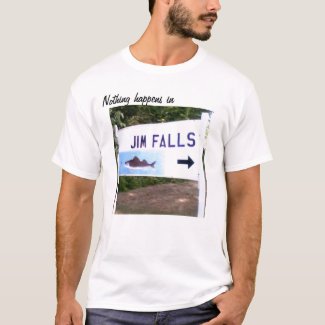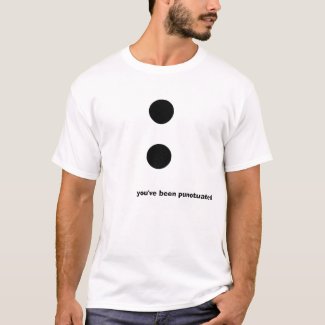
Here's an example of that last category, an example of something that sets me apart from the rest of humanity: I always intend the pun.
Ever hear someone say "no pun intended?" Why? Why don't they intend the pun? Or do they actually intend the pun but want you to think that they don't, want you to think they look down on puns when they don't actually look down on them at all -- they like the pun so much that they want to draw your attention to it and make sure that you notice it while pretending that they not only don't want you to notice it but they don't want to make the pun at all.
I think people who say "no pun intended" are the same kind of people who pretend not to watch TV and who make a point of buying only those lettuces that you wouldn't actually recognize as "lettuce" when it shows up in your salad. You just know that they're craving "BBQ Fritos" and an hour or so with "I Love the 80s." They should just give in and join the rest of us. Well, the rest of you; I'm set apart from humanity because I always intend my puns.
That's all a completely irrelevant intro to today's nomination, which is The Best Actor To Play God In A Movie Or TV Show. And in this nomination, I'm not set apart from humanity at all. For once, me and humanity and even Hollywood, which is almost kind of like a subset of humanity, are all in perfect synch: It's Morgan Freeman.

If you are writing a movie or TV show, and you're putting God in there as a character, you've got one of two ways to go:
1. Morgan Freeman.
2. A "shocking" "avant-garde" "radical" "way-out-there" "whoa, are we ever taking a risk with this religious imagery which is shocking, avant-garde, radical, and way-out-there so please watch and maybe drum up some controversy" version of God.
Let's talk about the latter, a perfect example of which, I assume, is found in that one Holly Hunter show in which she' s a cop or a drunk or both, and she meets God and he's a cop or drunk or both, too. I've never watched the show, and I've never watched the show because in the commercials, they showed God and God was a cop or drunk, or both, and that was so off-putting because it's been done to death, it's so dumb and trite by now that it's like having a professor, in the beginning of a horror movie, give a lecture in which the professor first explains exactly what's going to happen in the movie, then explains why what's going to happen in the movie is not going to happen at all because it's physically impossible. Then we watch for 91 minutes as what the professor said is not going to happen happens and he maybe dies. (See: M. Night Shymalan's "The Crappening.")
The only way to make that Holly Hunter tv show less appealing to me would be to have it written by Tina Fey. Or have Robin Williams play God as a drunk cop/gay rapper.
So let me just put this out there: There's nothing shocking about God being a bum or drunk or nerd or whatever it is you're trying to make God be. It's been done before, a hundred zillion times. There's just no need to make God be a skid-row loser to make whatever point it is that you think you're making.
Just what point is that, anyway? What artistic statement is actually being made? That you don't subscribe to everyday conventional notions? Okay, great. But if you're doing something in your 'art' that is being done for the sole purpose of being not like what other people are doing, maybe you need to rethink just what it is you're doing. Great art is created by inspiration, by having a message to communicate, by having an image or a melody or a story to pass on. I can't recall a single time in the history of, well, time, that the message "This is different from that" was communicated in a "great" way.
 Plus, there are some things that are just right. If you're going to draw a tree, well, then, you have to draw a tree. It has to have something that can be recognizable as branches and roots and leaves and a trunk. I hate to break this to you, modern artists, but scribbling some shapes onto paper, cutting words out of a magazine, and spitting on it, then calling it "Tree No. 1" does not make that a tree. Whatever the merits of that work -- if there are merits to it -- it's not a tree. It's just wrong.
Plus, there are some things that are just right. If you're going to draw a tree, well, then, you have to draw a tree. It has to have something that can be recognizable as branches and roots and leaves and a trunk. I hate to break this to you, modern artists, but scribbling some shapes onto paper, cutting words out of a magazine, and spitting on it, then calling it "Tree No. 1" does not make that a tree. Whatever the merits of that work -- if there are merits to it -- it's not a tree. It's just wrong.Just like putting some guy in a trenchcoat and having him drink Mad Dog 20/20 and calling him "God" in your TV show is, likewise, "wrong." Because if you're going to have a God character, at this point, it has to be Morgan Freeman.
The first time I recall Morgan Freeman playing God was Bruce Almighty, an okay movie in its own right, but one which really hit the nail on the head vis a vis what Morgan Freeman should be doing in films. I'm sure he was great on The Electric Company and all, but when you find your niche, run with it. Sam Waterston is a DA. Ben Stiller is an angry guy. And Morgan Freeman is God.
He was headed that way already, you know. From earlier movies, Morgan Freeman was clearly moving up the corporate ladder towards God; he was fast-tracked towards running the universe. He'd been playing smarter and kindlier and all-knowing-er people with each movie, climbing the rungs of "God, Inc." and it was only a matter of time until he became the CEO himself, as he did with "Bruce Almighty," and when he appeared as God, it just felt right, didn't it? He came out and told Jim Carrey what was going on and lectured him and consoled him and gave him advice, and it was all just exactly the way that God was supposed to be.
We don't, after all, want God to be an angry, Old Testament, Charlton-Heston-esque God (yes, I know that Heston played Moses, but if God was in that movie, Heston would have been God.) We don't want fire and brimstone and punishment.
I don't want, either, a George Burns-y smart-aleck God. I don't want God winking at me and making it rain in my car and making me feel like I'm never quite in on the joke, while at the same time kind of boring me like that weird uncle that shows up at Christmas, the one Mom and Dad always say "I guess we've got to invite Thomas, too," and they sigh. Then they look at you and say "And don't ask him for money, either," and it occurs to you that you could just ask relatives for money.
And, like I said, nobody wants drunk-I'm-a-hip-writer-God. Nobody. It's not cool.
So that leaves the Morgan Freeman God: A kindly guy who will give you advice but isn't going to make it easy for you. He's not just rolling over and saying Oh, all right, I'll fix the world. He's teaching a lesson to you, but not in a bad way, really, and he's doing it in a way that makes you like him a little more.
You can see just how right I am about what a great fit Morgan Freeman was in the role of God by looking at what he's done since then: Every role he's played, really, has been God. He was in Feast of Love, and he played God. I know his role wasn't named "God" but what would you call a character who mostly observes people's lives around him, knows everything before they do, and occasionally intervenes to push life in the direction it's supposed to go?
Or take March of the Penguins. Who did the voice over? Who let us in on the secret lives of penguins and explained how nature worked, expressing just the right amount of sadness when [SPOILER ALERT! FOR A DOCUMENTARY! CAN YOU BELIEVE IT?] a baby penguin dies? Only Morgan Freeman, as the voice of God.

See what I mean? It's a natural. Having Morgan Freeman play God is as natural, as right, as necessary, as having a tree have branches.
The Bible says that God made us in His image. That might have been true 2000 years ago, but at this point I like to think maybe God looked down and said, Wow, he's good, and maybe re-made Himself to look a little more like Morgan Freeman, The Best Actor To Play God In a Movie Or TV Show.

 special cool, hip, trendy in-the-huddle lingo. That's one tackle that can't be untacked, homeslice!)
special cool, hip, trendy in-the-huddle lingo. That's one tackle that can't be untacked, homeslice!)

































